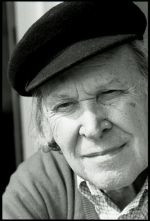
(Portugal, 1923–2005)
[October 2004]
Eugénio de Andrade (the pseudonym of José Fontinhas) was arguably Portugal’s best-known poet, translated into well over twenty languages. He adopted this pseudonym after a brief writing carreer under his true name. De Andrade won all of Portugal’s major literary awards: the prestigious Camões Prize, France’s Prix Jean Malrieu (1989), and the 1996 European Prize for Poetry. Marguerite Yourcenar has referred to “the well-tempered clavier” of his poems, and Spanish critic and poet Ángel Crespo has written that “his voice was born to baptize the world.”
De Andrade was often associated with the generation of ’27 in Spain: Luis Cernuda, Vicente Aleixandre, and particularly García Lorca, whom he translated in his youth. Though he distanced himself from an early attachment to Rilke, his love of the poetry of Greek antiquity remained intact, as well as his affinity for Chinese and Japanese poetry (especially Tu Fu and Bashô) and the French symbolists (especially Rimbaud). Amongst Americans, Walt Whitman was his poetic and even spiritual hero. Of earlier antecedents, he felt a vital connection to San Juan de la Cruz and to Vergil.
Eugénio de Andrade’s poetry has always exhibited a carefully evoked simplicity. Through naked word and image, he strives to convey what he calls “the rough or sweet skin of things.” Distrustful of abstractions, he focuses on the world of matter, proclaiming a love for “words smooth as pebbles, rough as rye bread. Words that smell of clover and dust, loam and lemon, resin and sun.” The four classical elements of earth, water, air, and fire are never absent from his work, nor is the human body, whose sensuality and sexuality lie at the heart of Dark Domain (a collection which includes the poems ‘Animals,’ ‘Silence.’ and ‘Inhabited body’). For this poet, proud to be called solar and pagan, the body itself is the final “metaphor for the universe.”
© Alexis Levitin
Poems
Articles
Eugénio de Andrade: A Translator’s View
Bibliography
Besides poetry, the author has published various prose works and translations into Portuguese. Only some of the foreign editions of his work are listed here.
In Portuguese
A partial listing, most published by Fundação Eugénio de Andrade, Oporto.
As Mãos e os Frutos, 1948.
Os Amantes sem Dinheiro, 1950.
As Palavras Interditas, 1951.
Até Amanhã, 1956.
Coração do Dia. Limiar, Oporto 1958.
Mar de Setembro, 1961.
Ostinato Rigore, 1964.
Obscuro Domínio. Limiar, Oporto 1971.
Véspera da Água, 1973.
Memório Doutro Rio, 1978.
Matéria Solar, 1980.
O Peso da Sombra, 1982.
Branco no Branco, 1984.
Vertentes do Olhar, 1987.
Contra a Obscuridade, 1988.
O Outro Nome da Terra, 1988.
Rente ao Dizer, 1992.
Ofício de Paciência, 1994.
O Sal da Língua, 1995.
Pequeno Formato, 1997.
Os Lugares do Lume, 1998.
Os Sulcos da Sede, 2001.
In English
All translated by Alexis Levitin.
Inhabited Heart: The Selected Poems of Eugénio de Andrade. Perivale Press, Los Angeles 1985.
‘White on white’ in Quarterly Review of Literature. Princeton, New Jersey 1987.
Memory of Another River. New Rivers Press, Minneapolis 1988.
The Slopes of a Gaze. Apalachee Press, Tallahassee, 1992.
Solar Matter. QED Press, Fort Bragg 1995.
Shadow’s Weight. Gávea-Brown Publications, Brown University, Providence 1996.
Another Name for Earth. QED Press, Fort Bragg 1997.
Dark Domain. Guernica Editions, Toronto 2000.
Close to Speech. Red Dancefloor Press, Lancaster, California 2000.
Forbidden Words. New Directions Publishing Corporation, New York 2003.
In French:
Matière solaire. Translated by Antónia Câmara Manuel, Michel Chandeigne, and Patrick Quiller. La Différence, Paris 1986.
Les Poids de l’ombre. Translated by Antónia Câmara Manuel, Michel Chandeigne, and Patrick Quiller. La Différence, Paris 1986.
Blanc sur blanc. Translated by Michel Chandeigne. La Différence, Paris 1988.
L’Autre nom de la terre. Translated by Michel Chandeigne and Nicole Siganos. La Différence, Paris 1990.
Versants du regard et autres poèmes en prose. Translated by Patrick Quillier. La Différence, Paris 1990.
Office de la patience. Translated by Michel Chandeigne. Orfeu-Livraria Portuguesa, Brussels 1995.
Le Sel de la langue. Translated by Michel Chandeigne. La Différence, Paris 1999.
Les Lieux du feu. Translated by Michel Chandeigne. Bordéus: L’Escampette 2001.
In Italian:
Ostinato Rigore, Antologia Poetica. Translated by Carlo Vittorio Cattaneo. Edizioni Abete, Roma 1975.
Memoria d’un Altro Fiume. Translated by Carlo Vittorio Cattaneo. Éditions Internationales Euroeditor, Luxemburg 1984.
Ufficio di Pazienza. Edizioni del Bradipo, Lugo 1997.
Il Sale della Lingua. Edizioni del Bradipo, Lugo 1998.
In Asturian:
Memoria d’outru riu. Translated by Antonio García. Libros de Frou, Oviedo 1985
Contra la Escuridá. Translated by Antonio García. Alvíras Llibros, Oviedo 1988.
In Basque:
Uraren Bezpera. Pamiela, Pamplona 1990.
In Catalan:
Matèria Solar. Translated by Vicente Berenguer. Gregal Llibres, Valencia 1987.
Ostinato Rigore. Manuel Guerrero Brullet. Edicions 62, Barcelona 1991.
Ran al Dir. 1994.
In Spanish:
Antología Poética 1940-1980. Translated by Ángel Crespo. Plaza & Janes, Barcelona 1981.
Blanco en lo Blanco. Translated by Fidel Villar Ribot. Editorial D.Quijote, Granada 1985.
Vertientes de la Mirada y Otros Poemas en Prosa. Translated by Ángel Crespo. Ediciones Júcar, Madrid 1987.
Ostinato Rigore. Translated by Manuel Guerrero. Ediciones de Mall, Barcelona 1987.
El Otro Nombre de la Tierra. Translated by Ángle Campos Pámpano. Pre-Textos, Valencia 1989.



